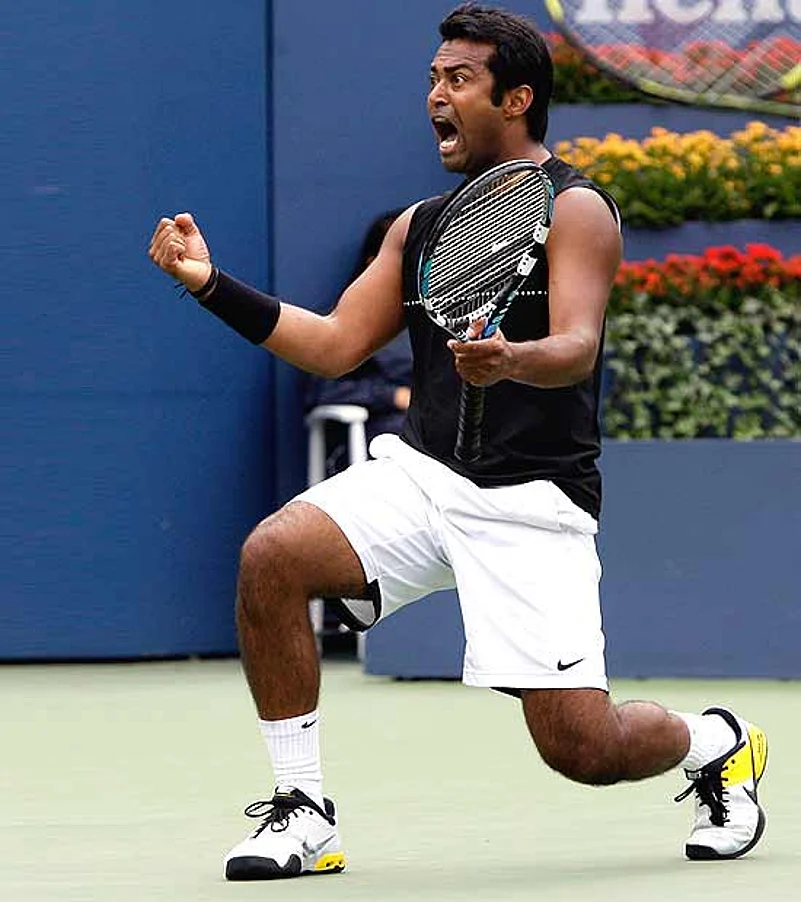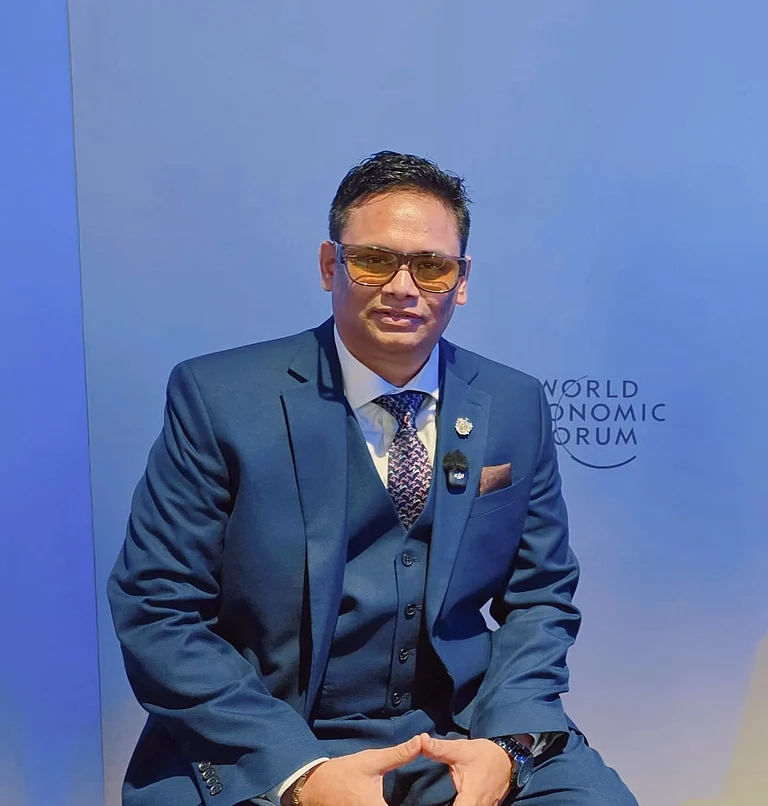I have known Leander for over 22 years, in various capacities—first when he was a promising junior, then when he played for India in the Davis Cup when I was captain, and now as a friend whom I watch playing and winning in courts around the world. We’ve kept up our friendship and that’s very precious to me. Leander was a very exciting player right from the start. In those days, what struck me most was the energy he brought into his game. He was untiring, full of energy and daring. In tough situations, even at the age of 18 or 19, he was mentally strong, and was not intimidated when he had a big player on the other side of the net. He would pump himself up emotionally, rouse the audience and raise his game when required.
Technically, he was a very swift mover around the court, had very quick hands and great reflexes. When he came into the Indian Davis Cup team, he was not yet 17, but fit in easily. I was the captain for a while, and I needed a youngster to play with, to feed off his energy. We had some good results. One memorable contest was in round one against Switzerland in the 1993 World Group. He’d won his first singles match and I’d lost mine. The doubles tie was crucial. We lost the first set and went into the tiebreaker in the second set. He made an unbelievable return of the ball that won us the point, made it 1-1 on sets and kept us in the match, and we won it in five sets eventually. We won the rubber and then played France in the quarterfinals—on the red clay of Frejus, Cannes. We lost in the doubles, but he won both his singles matches, and I won the deciding singles, to reach the semis. The conditions were difficult, especially against a partisan home crowd, but Leander came through.
His win/loss record in Davis Cup, 86/31, is very good; in singles, it is 48/22. He was quite good in singles, too. He has won a bronze medal at the Olympics, of course, and one ATP Tour title. He was quite a handful as a singles player, especially in the Davis Cup, in which he has beaten a lot of higher-ranked players, like Arnaud Boetsch, Henri Leconte, Wayne Ferreira, Goran Ivanisevic, Jan Siemerink and Jiri Novak. But, gradually, singles took a backseat as his doubles play was coming through so well. His first ATP Tour title came at home in 1997, when he and Mahesh Bhupathi won in Chennai. The two did very well together for several years. Mahesh had a good return of serve and powerful groundstrokes while Leander was quick on the net. Their styles and temperament combined well. In singles, you’re covering 27 feet of court yourself, in doubles you’re covering 36 feet between the two players. So it’s more a question of net play, of volleying. You can’t play from the baseline, and you don’t have to hit the ball five-six times in a row, as you have to do in singles to win a point. Leander’s reflexes are very good, he’s able to use his groundstrokes to get to the net, and he’s very good at the net. His game is well suited to doubles play. With age has come craftiness—he has learnt to temper his shot selection and energy.
Leander’s going to be 39, but one should not use the past tense with him. He’s done as well as anyone this year, winning the Australian Open. It’s fruitless to speculate on how long Leander can go on playing, for he’s in the midst of a good innings. A sportsman is always one serious injury away from a disruption in his career. Now as he has won his 50th men’s ATP doubles title, we should simply enjoy his game.
As told to Rohit Mahajan
- 7 April 1997, Chennai, Partner Mahesh Bhupathi
- 28 April 1997, Prague, Mahesh Bhupathi
- 28 July 1997, Montreal, Mahesh Bhupathi
- 11 August 1997, New Haven, Mahesh Bhupathi
- 29 September 1997, Beijing, Mahesh Bhupathi
- 6 October 1997, Singapore, Mahesh Bhupathi
- 5 January 1998, Doha, Mahesh Bhupathi
- 9 February 1998, Dubai, Mahesh Bhupathi
- 6 April 1998, Chennai, Mahesh Bhupathi
- 11 May 1998, Rome, Mahesh Bhupathi
- 5 October 1998, Shanghai, Mahesh Bhupathi
- 2 November 1998, Paris, Mahesh Bhupathi
- 5 April 1999, Chennai, Mahesh Bhupathi
- 24 May 1999, French Open, Paris, Mahesh Bhupathi
- 14 June 1999, Hertogenbosch, Netherlands Jan Siemerink
- 21 June 1999, Wimbledon London, Mahesh Bhupathi
- 5 July 1999, Newport, Wayne Arthurs
- 1 May 2000, Orlando, Jan Siemerink
- 9 October 2000, Tokyo, Mahesh Bhupathi
- 23 April 2001, Atlanta, Mahesh Bhupathi
- 30 April 2001, Houston, Mahesh Bhupathi
- 28 May 2001, French Open Paris, Mahesh Bhupathi
- 6 August 2001, Cincinnati, Mahesh Bhupathi
- 31 December 2002, Chennai, Mahesh Bhupathi
- 29 April 2002, Majorca, Mahesh Bhupathi
- 24 February 2003, Dubai, David Rikl
- 3 March 2003, Delray Beach, Nenad Zimonjic
- 7July 2003, Gstaad, David Rikl
- 7June 2004, Halle, David Rikl
- 5 July 2004, Gstaad, David Rikl
- 26 July 2004, Toronto, Mahesh Bhupathi
- 13 September 2004, Delray Beach, Radek Stepanek
- 11 April 2005, Monte Carlo, Nenad Zimonjic
- 18 April 2005, Barcelona, Nenad Zimonjic
- 26 September 2005, Bangkok, Paul Hanley
- 19 June 2006, Hertogenbosch, Netherlands, Martin Damm
- 28 August 2006, US Open New York, Martin Damm
- 19 February 2007, Rotterdam, Martin Damm
- 5 March 2007, Indian Wells, Martin Damm
- 21 September 2008, Bangkok, Lukas Dlouhy
- 6 June 2009, French Open Paris, Lukas Dlouhy
- 13 September 2009, US Open New York, Lukas Dlouhy
- 3 April 2010, Miami, Lukas Dlouhy
- 17 October 2010, Shanghai, Jürgen Melzer
- 9 January 2011, Chennai, Mahesh Bhupathi
- 2 April 2011, Miami, Mahesh Bhupathi
- 21 August 2011, Cincinnati, Mahesh Bhupathi
- 8 June 2012, Chennai, Janko Tipsarevic
- 28 January 2012, Aus Open Melbourne, Radek Stepanek
- 31 March 2012, Miami, Radek Stepanek


























